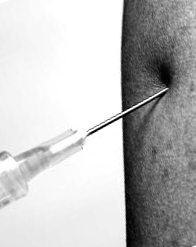Experts chase expired shots
 Authorities are trying to contact thousands of patients who were potentially injected with expired vaccines by two Sydney GPs.
Authorities are trying to contact thousands of patients who were potentially injected with expired vaccines by two Sydney GPs.
Vaccines found to have expired or not been stored properly were administered by the two GPs, including shots for measles mumps and rubella (MMR), the seasonal flu formulations and a range of vaccines on the National Immunisation Program.
Sydney Local Health District said the vaccines were discovered at a Burwood practice, located at 40 Lindsay Street, run by doctors Darrel and Brinda Weinman.
“We are writing to patients of that practice to ask them to get advice from a new GP on the need for re-vaccination,” district clinical director Dr Leena Gupta said.
“While NSW Health does not have responsibility for GPs, we are assisting co-regulators the Medical Council of NSW and the NSW Health Care Complaints Commission in investigating and responding to these incidents.”
Dr Gupta said inconsistent record keeping at the practice made it difficult to find contact details for all patients.
“There is no harm in giving a vaccine that is less effective, other than needing to be re-vaccinated again,” Dr Gupta said.
“Re-vaccination in itself is unlikely to cause any harm.”
Professor Nikolai Petrovsky from the College of Medicine and Public Health at Flinders University says it is a timely warning for all practices.
“These stories highlight the importance of correct storage of vaccines, many of which are quite fragile,” he said.
“Not only is it important to monitor their expiry date and discard them once this is passed, but it is also important to recognise that vaccines can be easily damaged and may lose effectiveness even before their expiry date if stored inappropriately.
“In many cases, vaccines will lose activity if they either become too cold and freeze, or if they are exposed to high temperatures, even for short periods of time.
“A common problem is freezing if vaccines are put too close to the back of a fridge near the freezing plate.”
Prof Petrovsky said new vaccines will help reduce the risk.
“Development of heat stable vaccines is particularly important for vaccines for use in developing countries where refrigeration is less reliable, but as these stories show problems of vaccine stability are not just restricted to poor countries but can occur anywhere.”







 Print
Print